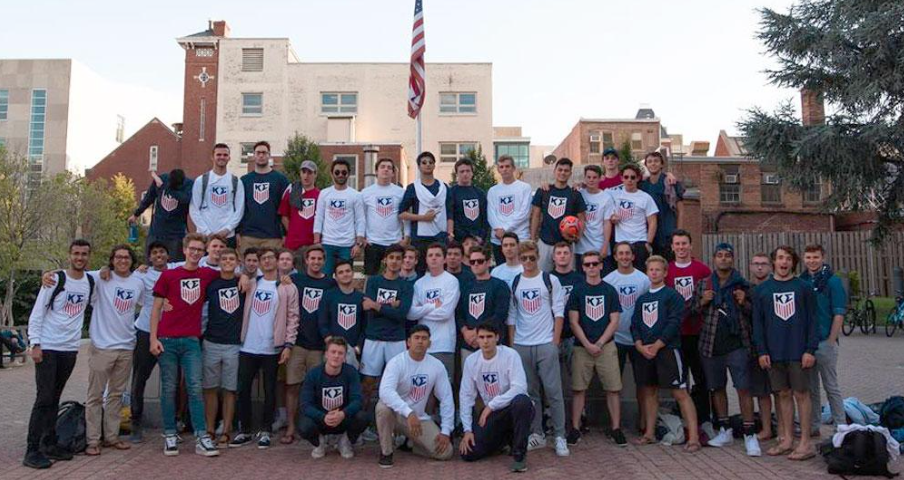By Megan Krueger
Chances are, if you’re a TikTok local, you’ve encountered the hashtag #bamarushtok at least once this past rush season. The trending videos of University of Alabama women showing off their carefully curated rush outfits and updating viewers on the events of recruitment week are both amusing and somewhat shocking to those of us less familiar with college Greek life—it is also worth noting that at GW, Greek life looks much, much different. However, this trend has prompted some investigation into the history of Greek organizations and increased skepticism of their continued prevalence.
Greek life is a tradition that goes back to the very beginning of the United States, with the first fraternity, Phi Beta Kappa (now an academic honor society), founded in 1776 at the College of William & Mary. This private organization was likely a more mysterious spin on public Latin Societies, which were fraternal organizations championing values such as scholarship and rhetoric that existed at many universities around the country. While aspects of Phi Beta Kappa chapters looked very different from modern fraternities (for example, their focus on debate and literature as well as their restriction of membership to upperclassmen and even faculty), they paved the way for what is widely regarded as the birth of the fraternity system at Union College. During this time, organizations centered their mission around brotherhood and began to establish a national presence. Inspired by these groups, the mid-19th century would see the first “women’s fraternity,” the I.C. Sorosis, at Monmouth College.
Today, fraternities and sororities exist at more than 800 institutions in the United States and Canada. George Washington University specifically has 34 official fraternity and sorority chapters and estimates that about 1,300 students are involved in these organizations. While the university supports their panhellenic communities based on their commitment to leadership and community service, it can certainly be observed that Greek life is not as popular at GW compared to other American universities. Only about 11% of undergraduates participate in Greek life, likely due to the fact that GW’s campus is so integrated into the city. Before the establishment of Townhouse Row and other university-owned housing options, frats and sororities had issues affording housing or securing places to meet near campus. Additionally, there are now many other social opportunities that students may turn to for a sense of community, rendering Greek life unnecessary in the eyes of some.
Another factor that may be impacting membership is greater issues with the Greek system as a whole. The most obvious barrier is the cost: GW students can expect to drop a few hundred dollars for membership each semester, as well as pay out of pocket for council events during the year. Elsewhere in the country, Greek life can be insanely pricey, costing members upwards of $1,000 per semester.
Unfortunately, this price tag is really not surprising, especially considering that the Greek system has always been known for its elitism. Researchers at Princeton found that a whopping 95% of Greek life participants came from upper-class backgrounds. Panhellenic organizations also have a long history of segregation. Even though it is now illegal for frats and sororities to discriminate on the basis of race, it is impossible to ignore that many mainstream Greek-letter groups are sorely lacking in diversity (take Bama Rush as an example). While Greek societies do not outwardly appear to discriminate against low-income students or people of color, their recruitment practices still allow them to maintain a predominately white, wealthy membership.
Other downsides of the Greek system include the strong drinking culture and emphasis placed on party life, not to mention hazing rituals which, on a shockingly large number of occasions have resulted in the death of one or more members. Greek life is also notorious for its perpetration of rape culture; studies show that fraternity members are three times more likely to commit sexual assault than other male students and sorority sisters are 74% more likely to experience rape than nonaffiliated female students. GW itself has seen its fair share of irresponsible and downright dangerous behavior from Greek societies. On campus, frats have admitted to not complying with Title IX training requirements, been investigated for hazing and underage drinking, and faced backlash for insensitive racist social media posts made by members. In 2019, the Feminist Student Union campaigned for students not to rush, claiming that Greek life perpetrates “white supremacy and rape culture.”
However, it would be unfair to ignore the positive outcomes of Greek life. These include a higher likelihood of forging close relationships with mentors, professors, and alumni, resulting in higher rates of employment after graduation. Greek life benefits universities because it gets students engaged with campus life and affiliated alumni are much more likely to donate to their alma mater. Many professionals working in business and government have backgrounds in Greek life, including many of GW’s own esteemed alumni such as J. Edgar Hoover, a past director of the FBI, and Edward W. Gnehm Jr., who served as a U.S. ambassador.
In short, Greek life has the potential to enrich college life and provide members with connections that will last them well into adulthood. But, in many other ways, the system is extremely problematic and somewhat antiquated at a school like GW where student organizations and programs for community-building, professional development, and civic engagement are plentiful. Even looking past Greek life’s legacy of discrimination of disregard for individuals’ well-being, the Greek system can stifle individuality among members and create an environment dominated by a group-think mentality which actively opposes GW’s main principles. If GW is going to continue to pride itself on its progressiveness and social awareness, it might be time for students and staff alike to determine whether or not we should continue allowing Greek life on campus.

